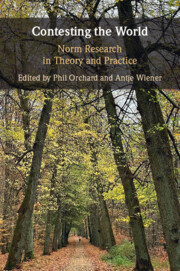Book contents
- Contesting the World
- Contesting the World
- Copyright page
- Contents
- Figures
- Tables
- Contributors
- Acknowledgements
- Abbreviations
- 1 Introduction
- Part I Norm Strength, Collisions, and Conflicts
- Part II Development of the Field
- 5 A Brief History of Norms about Race
- 6 Emotion and Norms in International Shaming Practices
- 7 Advancing Rights through an Accountability Norm?
- 8 Beyond Appropriateness
- Part III Meta-theorising, Linkages, and International Law
- Part IV Dimensions of Norm Contestation
- References
- Index
5 - A Brief History of Norms about Race
from Part II - Development of the Field
Published online by Cambridge University Press: 01 November 2024
- Contesting the World
- Contesting the World
- Copyright page
- Contents
- Figures
- Tables
- Contributors
- Acknowledgements
- Abbreviations
- 1 Introduction
- Part I Norm Strength, Collisions, and Conflicts
- Part II Development of the Field
- 5 A Brief History of Norms about Race
- 6 Emotion and Norms in International Shaming Practices
- 7 Advancing Rights through an Accountability Norm?
- 8 Beyond Appropriateness
- Part III Meta-theorising, Linkages, and International Law
- Part IV Dimensions of Norm Contestation
- References
- Index
Summary
More than three decades of the ‘constructivist turn’ in IR has led to clear insights about what the field gained and lost as ‘norms’ moved from the margins to the mainstream. What happened to the pathbreaking theoretical and empirical claims of the late 1980s and early 1990s? The critical edge dropped out, and the field fractured into silos, while an Atlantic divide deepened. Norms got reduced to an analytical factor to be tested. Can renewed attention to critical and holistic aspect of norms, help the world to craft better responses to climate change or pandemics? Not until the field confronts embedded hierarchies built on racism. I explore this overarching claim about racial hierarchy through the historically rooted themes of rights, migration, and nationality. I stress that IR mistakenly builds on the assumption of domestic jurisdiction as a fundamental feature of the inter-state system, rather than as a constitutive norm specific to the early twentieth century. With a conceptual stroke, the discipline eliminates imperialism, in theory and practice. Contrary to conventional wisdom, I do not privilege 1945, or 1648; our genealogical travels concentrate on the 1920s. Even a cursory glance at the diplomatic record reveals persistently fierce contestation over race.
- Type
- Chapter
- Information
- Contesting the WorldNorm Research in Theory and Practice, pp. 85 - 100Publisher: Cambridge University PressPrint publication year: 2024
- 1
- Cited by

